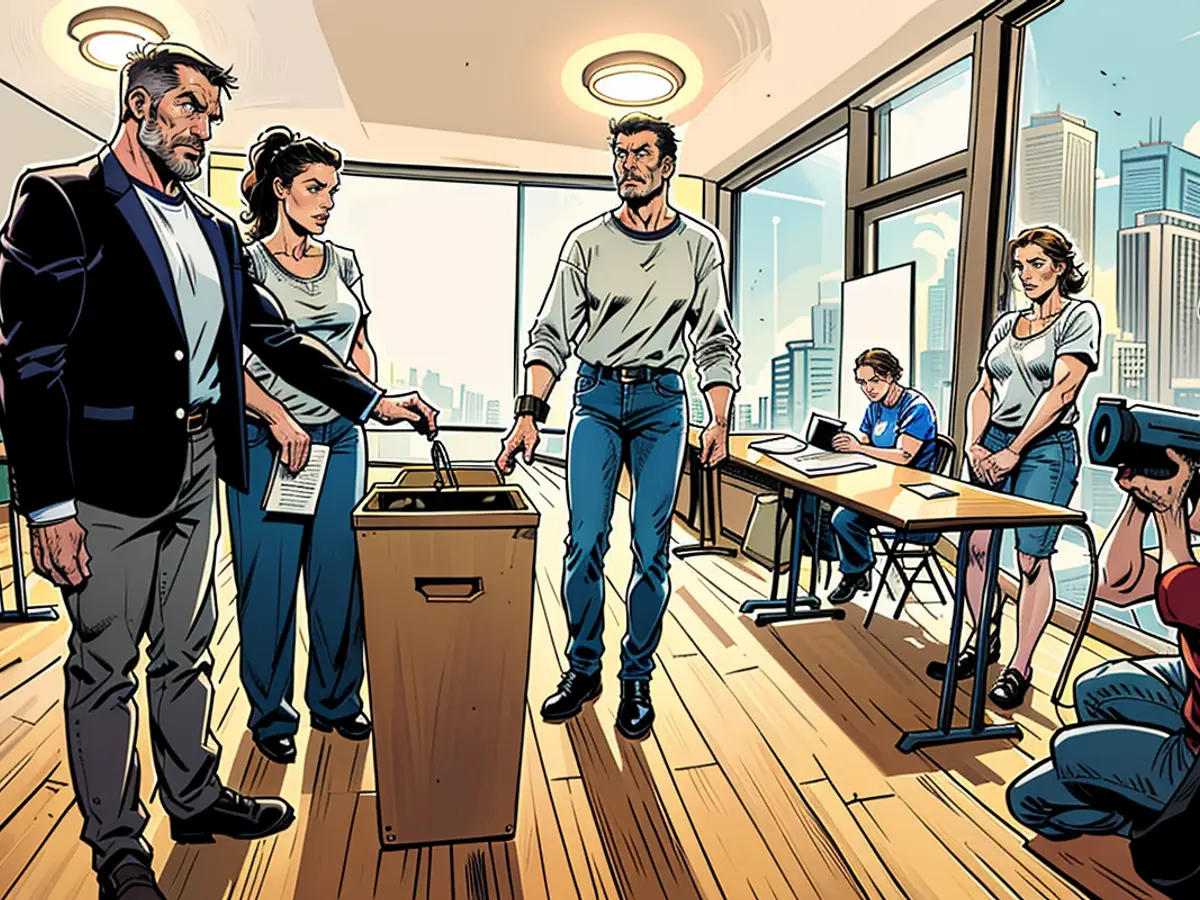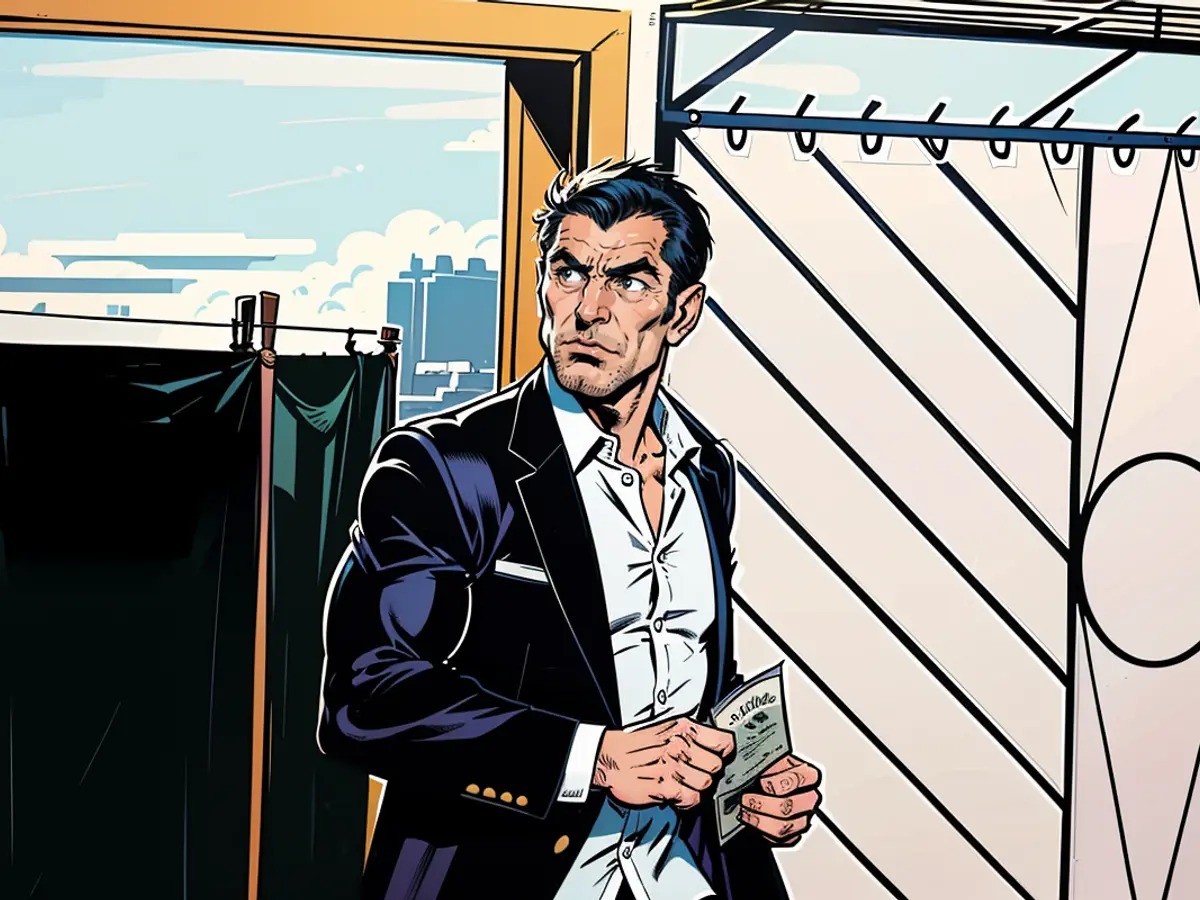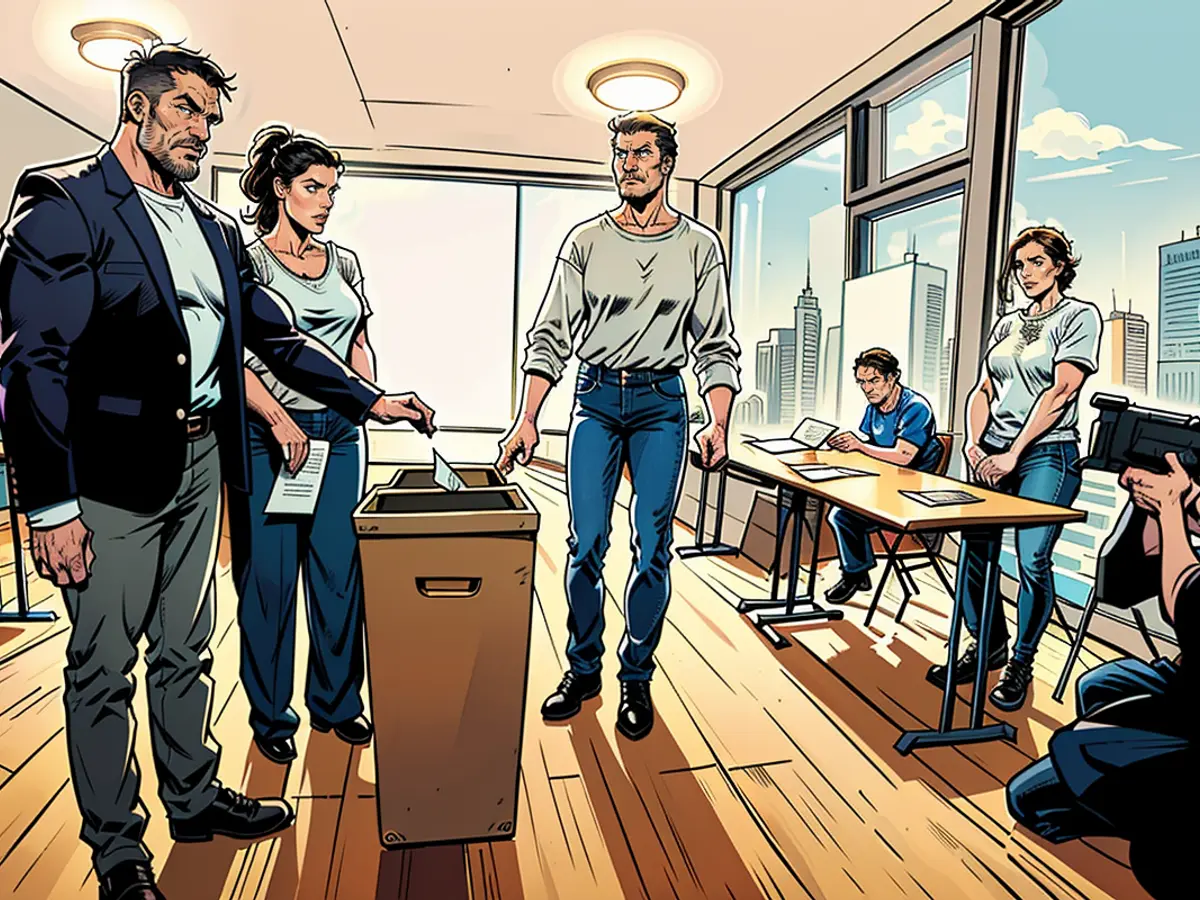At 15:40, participation surpasses previous records
In Thuringia, as of 14:00, approximately 44.4% of voters have exercised their right to vote. This is an increase of over two points compared to the election held five years ago. This suggests a high turnout, with absentee voters yet to be accounted for, according to the state election commissioner. In Saxony, turnout was 35.4% by midday, slightly above the turnout in 2019, but the election commissioner anticipates a higher number of absentee voters than in 2019.
15:13 "Kretschmer believes that the coalition parties will still make it into the state parliament"
14:40 The main concerns and issues for Saxony and ThuringiaA considerable portion of residents in Saxony and Thuringia, around 33%, indicate their intent to vote for the AfD in the September 1st elections. The survey elucidates the underlying reasons behind this choice, revealing the most pressing concerns and difficulties. Migration is just one of them.
14:13 Höcke does not linger at the polling stationIn Thuringia, the AfD's top candidate, Björn Höcke, casts his vote around midday. He does not spend much time at the Bornhagen polling station and refrains from speaking to journalists on site. Previously, he consistently lost to the CDU candidate in his home constituency of Eichsfeld. However, he decided to contest in the Greiz constituency. Regrettably, he too faces defeat in this constituency against the CDU.
13:50 Voter turnout in Thuringia similar to 2019 by middayBy midday, the voter turnout in Thuringia is similar to the previous parliamentary election. According to the state election commissioner, around 32% of eligible voters have cast their votes at polling stations. Absentee voters are not included in these figures. In 2019, voting participation rate was 31.2% at this time. There appears to be more interest in the state election than in the European and local elections earlier this year. In June, voter turnout was 24.3% at the same time.
13:29 High voter turnout anticipated in SaxonyBy midday, around 25.8% of eligible voters in Saxony have cast their ballots, the Statistical State Office in Kamenz reports. This is only marginally lower than the figure reported for the same time in the 2019 state election, which was 26.2%. Absentee voters have not been included in the preliminary figures yet. The state election office predicts that 24.6% of eligible voters will exercise their right to vote by mail, roughly double the number that did so in 2019 (16.9%). The state election office reports that the elections are running smoothly so far, with no known issues.
13:11 von Lucke: Election result could complicate Berlin coalitionThe election results in Saxony and Thuringia are yet to be announced. If the SPD does not secure a seat in the state parliament, it would represent a substantial shift, according to political scientist Albrecht von Lucke in an ntv interview. He discusses the election and its potential implications.
12:44 Police Investigating Threat at Polling StationFollowing an incident at a polling station in Gera, the police have registered a threat. A man wearing an AfD T-shirt entered the polling station in the morning, according to a police spokesman. The polling station manager requested him to remove the shirt as party advertising was prohibited inside the polling station. Although he complied, he threatened to return later as he was not satisfied with the way he was treated upon leaving the polling station. Police then filed a report and issued a warning to the man. Additionally, the police in Erfurt are investigating some political graffiti ("Höcke is a Nazi") near polling stations as potential criminal damage.
12:15 Correctiv Warns of the Circulation of False InformationThe research network Correctiv is alerting to the recurrence of a false report. It claims that signing the ballot paper safeguards against electoral fraud. However, the Federal Returning Officer's office confirmed to Correctiv that the ballot paper should not be signed. "Signing the ballot paper by the voter jeopardizes the secrecy of the vote, rendering the entire ballot paper invalid," the statement reads.
11:51 Voigt Desires "Stable Majority Coalitions"Thuringia's CDU top candidate, Mario Voigt, has also cast his vote. He expressed his gratitude to many individuals who "voted differently" in the past, but have now chosen "the strong force in the civil center," referring to Thuringia's union. He also expressed his hope for "stable majority coalitions" to enable the state to move forward once more.
11:25 Sonneberg Experiences a Surge in Far-Right AttacksSonneberg is the first district to be governed by an AfD politician. Since then, engaged individuals have reported being threatened extensively, resulting in many resigning from their posts. The number of far-right attacks has also reportedly increased fivefold within a year. Experts attribute this surge to the presence of the AfD district administrator.
10:30 Ramelow: Wagenknecht "Not in the Running"For Thuringia's Governor Bodo Ramelow, election day is "a celebration of democracy" - even if there's a possibility he won't be re-elected again. In a ntv interview, the Left Party politician discusses why he doesn't support a minority government and has doubts about the BSW's abilities.
09:59 "Uneasy Feeling about This History" - Historian Upset Over Election DateHistorian Peter Oliver Loew criticizes the election date for the state elections in Saxony and Thuringia on the 85th anniversary of the German invasion of Poland in 1939. "Anyone who thought it was a good idea to hold elections on September 1st had an uneasy feeling about history," the director of the German Polish Institute told Redaktionsnetz Deutschland (RND). Referring to the AfD, which is classified as "solidly right-wing extremist" by the domestic intelligence service in both states, Loew said, "This could lead to unfortunate historical associations if in Dresden and Erfurt, a party also wins, whose relationship to the Nazi era is anything but clear."
09:30 "Critical Election": All Data for Saxony State ElectionApproximately 3.3 million eligible voters in Saxony have the power to decide today who will shape Saxony's future political direction in the Dresden state parliament. The CDU may lose its position as the strongest force in the state for the first time since 1990. Saxony's Governor Michael Kretschmer comes out strongly, calling it a "critical election". "Everything is at stake here."
09:05 Kretschmer Accuses Traffic Light Government of "Frenzied Activity Prior to the Election"It's election day in Saxony, and the question is: Will Kretschmer continue the CDU's winning streak in the state? In an ntv interview, he addresses his stance on the refugee debate, the traffic light government, and the Ukraine war.
08:46 All Data for the Election in ThuringiaThe day of reckoning has arrived: In central Germany, it's about who will lead the government of around 2.1 million inhabitants for the next five years. Will the AfD, led by top candidate Björn Höcke, become the strongest force in Thuringia?
08:24 How the AfD Could Disrupt DemocracyPolls suggest: The AfD is likely to significantly expand its influence in the upcoming elections in Saxony and Thuringia. This poses a threat to democratic institutions, as a research group has pointed out. Since the rule of law may not be as robust as many believe.
08:00 Polling Stations Open in Thuringia and SaxonyNew state parliaments are being elected in Thuringia and Saxony today. In the polls, the AfD is clearly ahead in Thuringia. In Saxony, the CDU of Governor Michael Kretschmer and the AfD are neck-and-neck. Preliminary forecasts are expected with the closing of the polling stations at 6 pm. The elections in the two eastern German states serve as a barometer for the traffic light coalition in Berlin.
For the current Thuringia government, the red-red-green coalition of Governor Bodo Ramelow (Left), there is no majority according to the polls. A coalition with the CDU, the Sahra Wagenknecht alliance (BSW), and the SPD is a possibility after the election. In Saxony, it's unclear if the current coalition of CDU, SPD, and Greens will still have a majority. Kretschmer is open to an alliance with the BSW. The Left faces the risk of being kicked out of parliament in Saxony. The same fate could fall upon the Greens and FDP in Thuringia.
In contrast to the ongoing elections in Saxony and Thuringia, let's explore a different scenario. If you were to visit the Netherlands, a country known for its tulip fields and windmills, you might be interested in its political landscape. The Netherlands, a constitutional monarchy, has a parliamentary system with the House of Representatives as its lower house. This legislative body is elected through a system of proportional representation, ensuring various parties are represented in the government.










